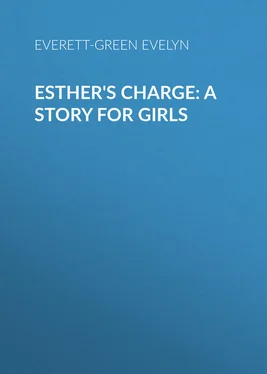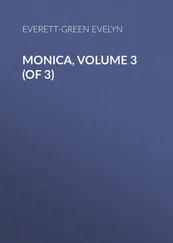Evelyn Everett-Green - Esther's Charge - A Story for Girls
Здесь есть возможность читать онлайн «Evelyn Everett-Green - Esther's Charge - A Story for Girls» — ознакомительный отрывок электронной книги совершенно бесплатно, а после прочтения отрывка купить полную версию. В некоторых случаях можно слушать аудио, скачать через торрент в формате fb2 и присутствует краткое содержание. Издательство: Иностранный паблик, Жанр: foreign_antique, foreign_prose, на английском языке. Описание произведения, (предисловие) а так же отзывы посетителей доступны на портале библиотеки ЛибКат.
- Название:Esther's Charge: A Story for Girls
- Автор:
- Издательство:Иностранный паблик
- Жанр:
- Год:неизвестен
- ISBN:нет данных
- Рейтинг книги:5 / 5. Голосов: 1
-
Избранное:Добавить в избранное
- Отзывы:
-
Ваша оценка:
- 100
- 1
- 2
- 3
- 4
- 5
Esther's Charge: A Story for Girls: краткое содержание, описание и аннотация
Предлагаем к чтению аннотацию, описание, краткое содержание или предисловие (зависит от того, что написал сам автор книги «Esther's Charge: A Story for Girls»). Если вы не нашли необходимую информацию о книге — напишите в комментариях, мы постараемся отыскать её.
Esther's Charge: A Story for Girls — читать онлайн ознакомительный отрывок
Ниже представлен текст книги, разбитый по страницам. Система сохранения места последней прочитанной страницы, позволяет с удобством читать онлайн бесплатно книгу «Esther's Charge: A Story for Girls», без необходимости каждый раз заново искать на чём Вы остановились. Поставьте закладку, и сможете в любой момент перейти на страницу, на которой закончили чтение.
Интервал:
Закладка:
"Your uncle is a well-to-do man, my dear, and he truly says that terms at good private schools, where the holidays have to be provided for as well, run into a lot of money. And he does not think the boys are fit for school yet. He says they want breaking in by a tutor first. They have had a governess up till now, but he thinks a tutor would be better, especially as there is no man in this house. I hope he does not mean that the boys are very naughty and troublesome. I don't know what I shall do with them if they are."
The lady sighed, and looked at Esther in that half helpless way which always went to the little girl's heart. She bent over and kissed her brow.
"Never mind, mama dear. I will take care of the boys," she said, in her womanly way. "They are both younger than I. I think it will be nice to have regular lessons again. I think papa would have been pleased about that. And perhaps I shall like having boys to play with too; only it will be strange at first."
"We could keep a girl, then, to help Genefer and Janet," said Mrs. St. Aiden. "The boys will have to have the big attic up at the top of the house, and the study to do lessons in. I hope they will not be very noisy; and there is the garden to play in. But they must not break the flowers, or take the fruit, or spoil the grass, or cut up the gravel. You will have to keep them in order, Esther. I can't have the place torn up by a pair of riotous boys."
"I will take care of them, mama dear," answered Esther bravely, though her heart sank just a little at the thought of the unknown element about to be introduced into her life. She had had so little experience of boys – there was only little Herbert at the rectory who ever came here, and he was quite good, and under the care of his elder sisters. Would these boys let her keep them in order as Bertie was kept by Prissy and Milly? She hoped they would, and she said nothing of her misgivings to her mother.
"Do you think you will say 'yes' to Uncle Arthur?"
"I think I must, my dear. I don't like to refuse; and, of course, there are advantages. Your education has been a difficulty. I have not the health myself, and we cannot afford a governess for you, and this is the first time Arthur has ever asked me to do anything for him. And, really, I might be able to keep a little pony carriage, and get out in the summer, with this addition to our income. I always feel that if I could get out more I should get back my health much quicker."
Esther's eyes sparkled again at these words, and a little pink flush rose in her cheeks. It was the thing of all others she had always wished for her mother – a dear little pony, and a little low basket carriage in which she could drive her out.
In father's days they had had one, and Esther had been allowed to drive the quiet pony when she was quite a little child. But that belonged to the old life, before the father had been taken away and they had come here to live, right down in Cornwall, at this little quaint Hermitage, as the house was called. Since then no such luxury could be dreamed of. It had been all they could do to make ends meet, and keep the mother content with what could be done by two maids, and one man coming in and out to care for the garden. And even so, Esther often wondered how they would get on, if it were not for all that Mr. Trelawny did for them.
"O mama!" she cried, "could we really have a pony again?"
"We will think about it. I should like to, if we could. It seems a pity that that nice little stable should stand empty; and there is the little paddock too. The pony could run there when he wasn't wanted, and that would save something in his keep. I have always been used to my little drives, and I miss them very much. But, of course, I shall not make up my mind in a hurry. I should like to see Mr. Trelawny about it all even before I write to Uncle Arthur."
A little shadow fell over Esther's face. She felt sure she knew what was coming.
"I wish, dear, you would just run up to the Crag and ask Mr. Trelawny if he would come down and see me about this."
The shadow deepened as the words were spoken, but Esther made only one effort to save herself the task.
"Couldn't Genefer go, mama? It is so hot!"
"It will be getting cooler every hour now, and there is plenty of shade through the wood. Have you had a walk to-day?"
"No, mama; I have been busy. Saturday is always a busy day, you know."
"Then a walk will do you good, and you will go much quicker than Genefer. Bring Mr. Trelawny back with you if you can. You can tell him a little about it, and he will know that it is important. You have time to go and come back before your tea-time."
Esther did not argue the matter any more. She had never betrayed to any living creature this great fear which possessed her. She was half ashamed of it, yet she could never conquer it. She was more afraid of Mr. Trelawny than of anything in the world beside. He was like the embodiment of all the wizards, and genii, and magicians, and giants which she had read of in her fairy story-books, or of the mysterious historic personages over whom she had trembled when poring over the pages of historical romance.
He was a very big man, with a very big voice, and he always talked in a way which she could not fully understand, and which almost frightened her out of her wits.
It was the greatest possible penance to have to go up to his great big house on the hill, and she never approached it without tremors and quakings of heart. She fully believed that it contained dungeons, oubliettes, and other horrors. She had been told that the crags beneath were riddled with great hollow caves, where monks had hidden in times of persecution, and where smugglers had hidden their goods and fought desperate battles with the excise officers and coast-guardsmen. The whole place seemed to her to be full of mystery and peril, and the fit owner and guardian was this gigantic Cornish squire, with his roiling voice, leonine head, and autocratic air.
He was always asking her why she did not oftener come to see him, but Esther would only shrink away and answer in her low, little voice that she had so much to do at home. And then he would laugh one of his big, sonorous laughs, that seemed to fill the house; and it was he who had given her the name of the "little manager," and when he called her by it he did so with an air of mock homage which frightened her more than anything else. At other times he would call her "Goldylocks," and pretend he was going to cut off her hair to make a cable for his yacht, which lay at anchor in the bay; and he would tell her a terrible story about a man who sought to anchor in the middle of a whirlpool, the cable being made of maidens' hair – only the golden strand gave way, and so he got drowned instead of winning his wife by his act of daring boldness. This story was in verse, and he would roll it out in his big, melodious voice; and she was always obliged to listen, for the fascination was strong upon her. And then in the night she would lie shivering in her bed, picturing Mr. Trelawny and his yacht going round and round in the dreadful whirlpool, and her own chestnut-brown hair being the cable which had failed to hold fast!
And yet Mr. Trelawny was a very kind friend to them. He was a relation, too, though not at all a near one, and had been very fond of Esther's father, who was his kinsman. When the widow and child had been left with only a small provision, Mr. Trelawny had brought them to this pretty house at the foot of the hill upon which his big one stood. He had installed them there, and he would not take any rent for it. And he sent down his own gardener several times a week to make the garden trim and bright, and keep it well stocked with flowers and fruit.
Once a week he always came down himself and gave an eye to everything. Mrs. St. Aiden looked forward to these visits, as they broke the monotony of her life, and Mr. Trelawny was always gentle to the helpless little widow. But Esther always tried to keep out of the way when she could, and the worst of it was that she was afraid Mr. Trelawny had a suspicion of this, and that it made him tease her more than ever.
Читать дальшеИнтервал:
Закладка:
Похожие книги на «Esther's Charge: A Story for Girls»
Представляем Вашему вниманию похожие книги на «Esther's Charge: A Story for Girls» списком для выбора. Мы отобрали схожую по названию и смыслу литературу в надежде предоставить читателям больше вариантов отыскать новые, интересные, ещё непрочитанные произведения.
Обсуждение, отзывы о книге «Esther's Charge: A Story for Girls» и просто собственные мнения читателей. Оставьте ваши комментарии, напишите, что Вы думаете о произведении, его смысле или главных героях. Укажите что конкретно понравилось, а что нет, и почему Вы так считаете.












